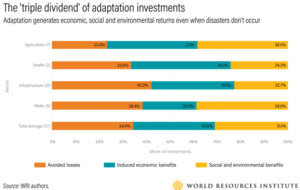Half the world getting an extra month of extreme heat, Auckland and Wellington A-listed and yet more on cephalopods
In this issue:
Half the world suffers an extra month of extreme heat
That’s the startling finding of a joint study from World Weather Attribution, Climate Central and the Red Cross Red Crescent Climate Centre. The study found over 4 billion people experienced an extra 30 days of extreme heat compared with the year before (May to May). The number of extreme heat days has doubled in 195 countries compared with a world without climate change. Topping the list was Aruba (Caribbean), which experienced 187 days of extreme heat in the last year. The increase in exposure to extreme heat carries obvious implications for health and the cost of dealing with increased heat-related health issues and extra cooling.
Auckland and Wellington A-listed - again
CDP has just published its annual listing and, for 2024, both Auckland and Wellington made it onto the A list. The project analyses environmental data from nearly 1,000 cities and regions with around 15% achieving the A award. Congratulations to both.
$1 in adaptation yields $10.50 in benefits
The World Resources Institute reviewed the outcomes of 320 adaptation investments across 12 developing or semi-developed countries using a triple dividend approach and concluded they realised an annual return of 20%-27%, or $10.50 in benefits for each $1 invested over a 10 year period. The approach encompasses induced economic benefits and social and environmental benefits into assessments rather than focusing solely on avoided losses. Across all sectors, the co-benefits exceeded avoided loss benefits and the analysis provides a strong case for revising the standard approach to assessing adaptation investments.
Air conditioning in the news
There was an interesting news story on CBS this week with a report on the new cooling system in the Eleven Madison building in New York. Described as an “ice battery”, the system is saving the occupiers 40% on their cooling bill. The concept is simple, around 225 tonnes of ice is created overnight when power is cheaper, which is then used in the cooling system during the course of the day. It may not, technically, be the most efficient cooling method but is saving large amounts of money and effectively spreading load. There’s a short video on the system via the link.
Adaptive insulation
Scientists at Ulster University are currently working on dynamic insulation that reacts to temperature and can cut energy use by as much as 50%. Standard insulation is normally optimised for cold weather and works by trapping heat but the new panels switch thermal behaviour with the season. The system uses thermal diodes to allow walls and roofs to behave like a controllable thermal valve. The panels are being marketed by Switchable Insulation Innovations Ltd.
Guide to aligning financial and transition planning published
Accounting for Sustainability has just published a guide to help organisations align their financial planning with their climate transition plans. While firmly aimed at finance departments and finance professionals, it’s well worth energy and carbon managers developing a familiarity and maybe even making sure your finance department is aware of it.
Did you know …..
Octopuses are booming around the coast of the UK because of warming sea temperatures? Temperatures around southern English shores are running at around 2.5C above normal for the time of year and at around 4C above normal off the west of Ireland. The octopus boom is great, short-term news for fishermen who are cashing in but bad news for the shellfish they prey on and other cold water dwellers such as plankton and cod. Another ecosystem looking like it is tipping out of balance.

